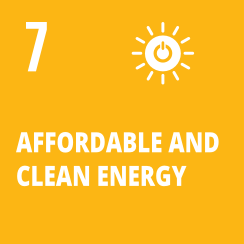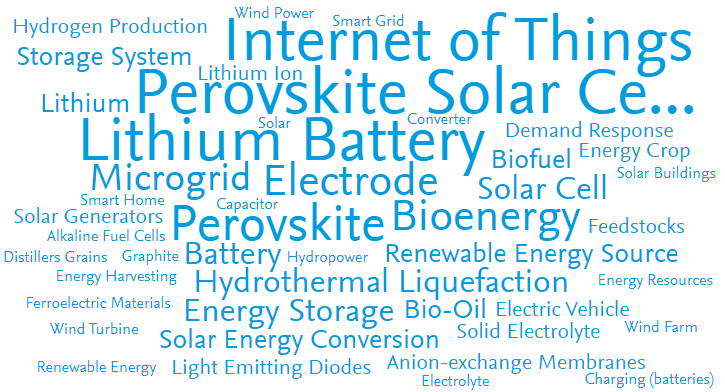
Ensure access to affordable, reliable, sustainable and modern energy for all
In order to meet this goal the targets are to ensure universal access to affordable, reliable and modern energy services; increase the share of renewable energy; double the global rate of improvement in energy efficiency; enhance international cooperation to facilitate access to clean energy research and technology; and to expand infrastructure and upgrade technology. Learn more about this goal in the Targets & Indicators section below.

Source: SciVal.com | This word cloud was created using publications from Penn State researchers
Related News
Making rechargeable batteries more sustainable with fully recyclable components
Rechargeable solid-state lithium batteries are an emerging technology that could someday power cell phones and laptops for days with a single charge. Offering significantly enhanced energy density, they are a safer alternative to the flammable [...]
Penn State, Shell announce collaboration focused on energy and sustainability
Penn State and Shell USA Inc. have announced the launch of a collaboration that will support efforts across the University’s mission of research, education and community impact. An initial commitment from Shell of more than [...]
Penn College’s Clean Energy Center to open Pittsburgh facility in early 2025
Pennsylvania College of Technology’s Clean Energy Center has announced a new strategic partnership with Pittsburgh Gateways Corp. to bring nationally recognized clean energy workforce solutions to Pittsburgh. The Clean Energy Center selected Pittsburgh Gateways to [...]
Berks student team developing EV charging stations receives national recognition
Penn State Berks student startup team Streamline Charging LLC has received national and University-wide recognition for its flexible and affordable electric vehicle (EV) charging solution that transforms the charging experience for apartment dwellers and service [...]
Scientists develop new method to create stable, efficient next-gen solar cells
Next-generation solar materials are cheaper and more sustainable to produce than traditional silicon solar cells, but hurdles remain in making the devices durable enough to withstand real-world conditions. A new technique developed by a team [...]
Penn State hosts SPARK 2050 energy summit to ignite energy transformation
To answer former Pennsylvania Gov. Tom Wolf’s call for an 80% cut to carbon emissions in the commonwealth by 2050, more than 100 stakeholders from across academia, government, industry and nonprofit sectors convened at Penn State [...]
Targets & Indicators
Target 7.1: By 2030, ensure universal access to affordable, reliable and modern energy services
- Indicator 7.1.1: Proportion of population with access to electricity
- Indicator 7.1.2: Proportion of population with primary reliance on clean fuels and technology
Target 7.2: By 2030, increase substantially the share of renewable energy in the global energy mix
- Indicator 7.2.1: Renewable energy share in the total final energy consumption
Target 7.3: By 2030, double the global rate of improvement in energy efficiency
- Indicator 7.3.1: Energy intensity measured in terms of primary energy and GDP
Target 7.a: By 2030, enhance international cooperation to facilitate access to clean energy research and technology, including renewable energy, energy efficiency and advanced and cleaner fossil-fuel technology, and promote investment in energy infrastructure and clean energy technology
- Indicator 7.a.1: International financial flows to developing countries in support of clean energy research and development and renewable energy production, including in hybrid systems
Target 7.b: By 2030, expand infrastructure and upgrade technology for supplying modern and sustainable energy services for all in developing countries, in particular least developed countries, small island developing States and landlocked developing countries, in accordance with their respective programs of support
- Indicator 7.b.1: Installed renewable energy-generating capacity in developing countries (in watts per capita)







